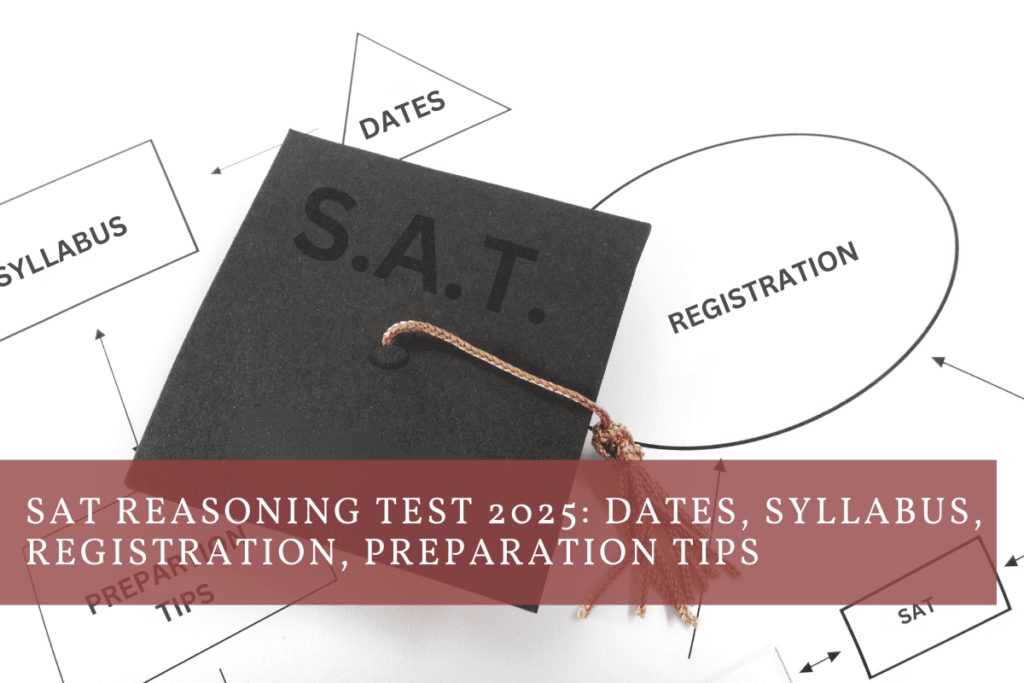The SAT Reasoning Test is a standardised entrance exam used for undergraduate admissions at universities abroad, especially in the USA and Canada. Around 2 million students appeared for the SAT during the 2024–25 testing cycle, making it one of the most widely taken university entrance exams globally. For Indian students planning to study overseas, a strong SAT score can add academic weight to their application, depending on the university and course requirements.
From 2026, the SAT is conducted entirely in a digital, computer-adaptive format, with a total testing time of 134 minutes. This blog focuses on the current structure of the SAT Reasoning Test, including the updated exam format, test dates, and India-specific registration fees, to help you plan your undergraduate applications with clear and reliable information.
Key Highlights: SAT Reasoning Test 2026
Here is everything you will learn in this blog on the SAT reasoning test.
| Particulars | Description |
|---|---|
| SAT Reasoning Test Fees | USD 130.98 (~INR 11,998) |
| SAT Reasoning Test Sections | 1. Reading & Writing2. Mathematics |
| SAT Reasoning Test Duration | 134 minutes (2 hours, 14 minutes) |
What is SAT Reasoning Test?
The SAT Reasoning Test is a computer-based exam used by universities to assess the academic skills of high school students.
The exam consists of two main sections, Reading & Writing and Mathematics. The questions focus on practical problem-solving rather than memorisation. If you are preparing for the SAT 1 Reasoning Test, understanding the format and question types is essential.
Your SAT score plays a key role in applications, especially for universities in the USA, Canada, UK, and Australia. To understand why universities ask for SAT scores and how they fit into undergraduate admissions decisions, you can also read about the purpose of the SAT exam.
Is SAT Reasoning Test Same as SAT?
You might have come across different terms like SAT and SAT Reasoning Test. In reality, they refer to the same exam. The term SAT Reasoning Test was used earlier to distinguish it from SAT Subject Tests.
However, in 2021, the College Board discontinued Subject Tests, making the SAT Reasoning Test the only version of the exam.
This exam focuses on critical reading, writing, and mathematics, whereas the old Subject Tests assessed specific subjects like Physics or Biology. If you are preparing for the SAT 1 Reasoning Test, you are essentially getting ready for the standard SAT that universities require for undergraduate admissions.
No matter what name you call it, your SAT score remains an important factor in applications.
SAT Reasoning Test Dates
The SAT Reasoning Test is offered multiple times a year, allowing you to choose a test date that aligns with your university application timeline. More than 4,000 universities and colleges in the USA accept SAT scores, making it a key requirement for undergraduate admissions.
If you are looking for the latest SAT Reasoning Test dates, here are the upcoming test schedules for 2026-2027 cycle.
Spring 2026 SAT Test Dates
These dates are ideal for Grade 11 (Juniors) to take their first attempt.
| SAT Digital Test Date 2026 | Registration Deadline | Late Registration/Change Deadline |
|---|---|---|
| March 14, 2026 | February 27, 2026 | March 3, 2026 |
| May 2, 2026 | April 17, 2026 | April 21, 2026 |
| June 6, 2026 | May 22, 2026 | May 26, 2026 |
Fall 2026 & Spring 2027 Anticipated Dates
The College Board typically releases these SAT exam dates as anticipated schedules to help students plan for Early Decision (ED) and Regular Decision (RD) applications.
| Season | SAT Digital Test Date (Anticipated) | Note for Indian Students |
|---|---|---|
| Fall 2026 | August 15, 2026 | Ideal for Fall 2027 early applications |
| September 12, 2026 | Popular for a final score boost | |
| October 3, 2026 | Key for November 1st Early Action deadlines | |
| November 7, 2026 | Suitable for Regular Decision backup | |
| December 5, 2026 | Last chance for most major universities | |
| Spring 2027 | March 13, 2027 | First attempt for Grade 11 students |
| May 1, 2027 | Recommended for retakes | |
| June 5, 2027 | Final test before the summer break |
SAT Reasoning Test Exam Fees
The SAT Reasoning Test comes with different costs depending on your registration choices. The base fee covers the standard test, but there are additional charges for late registration, rescheduling, or changing your test centre. If you plan to take the test multiple times to improve your score, you will need to pay the fee for each attempt.
Below is a breakdown of the SAT Reasoning Test fees for international students:
| SAT Exam Fees Type | Amount (USD & INR) |
|---|---|
| Standard Registration Fees (Mandatory) | USD 130.98 (INR 11,998) |
| Multiple Attempt Fees (Optional) | USD 130.98 (INR 11,998) |
| Test Centre Change Fees (Optional) | USD 34 (INR 3,114) |
| Rescheduling Fees (Optional) | USD 34 (INR 3,114) |
| Cancellation Fees (Regular) | USD 34 (INR 3,114) |
| Late Registration Fees (Optional) | USD 38 (INR 3,481) |
| Late Cancellation Fees (Optional) | USD 44 (INR 4,030) |
Note: The amount may vary depending on the currency exchange rate.
SAT Reasoning Test Syllabus & Format
The SAT Reasoning Test measures your skills in reading, writing, and mathematics. Understanding the exam format and syllabus is crucial to maximising your score. The test is designed to assess your ability to analyse, interpret, and apply knowledge rather than memorise facts.
If you are preparing for the SAT 1 Reasoning Test, focusing on key topics in reading, writing, and maths will help you perform better. Below is a breakdown of the syllabus and format.
Here is the SAT Reasoning Test exam format.
| Section | Number of Questions & Time Limit | Scoring Range |
|---|---|---|
| Reading & Writing | Questions: 54 Minutes: 64 | 200 to 800 |
| Mathematics | Questions: 44 Minutes 70 | 200 to 800 |
| Total Score | Questions: 98 Minutes: 134 | 400 to 1600 |
The exam is computer-based, with a mix of multiple-choice and grid-in questions. The total duration is 2 hours and 14 minutes, and each section is timed separately.
Now that you have an idea about the format, here are the SAT reasoning syllabus details.
Reading & Writing Section
- Reading Comprehension: Tests your ability to analyse themes, arguments, and key ideas.
- Grammar & Sentence Structure: Assesses punctuation, syntax, and sentence corrections.
- Vocabulary in Context: Measures your understanding of word meanings based on usage in passages.
Mathematics Section
- Algebra: Covers linear equations, functions, and inequalities.
- Advanced Maths: Includes nonlinear equations and systems.
- Problem-Solving & Data Analysis: Focuses on ratios, percentages, and interpreting data.
- Geometry & Trigonometry: Tests concepts like area, volume, and trigonometric functions.
The SAT Reasoning Test dates give you multiple chances to take the exam throughout the year. Make sure to plan your preparation based on your target university deadlines.
Registration Process for SAT Reasoning Test
Signing up for the SAT Reasoning Test is your first step towards applying to top universities. The process is straightforward, but you need to be mindful of registration deadlines to avoid extra charges.
Whether you are preparing for the SAT 1 Reasoning Test or retaking the exam, following the correct steps ensures a smooth experience.
Here are the steps.
1. Create an Account: Visit the College Board website and sign up with your details.
2. Complete the Registration Form: Enter your personal information and select your test preferences.
3. Choose a Test Date & Centre: Pick a test date from the available SAT Reasoning Test dates and find a nearby test centre.
4. Upload a Photograph: Ensure your photo meets the College Board’s requirements.
5. Pay the Registration Fee: Use a credit or debit card to complete the payment.
6. Print Your Admission Ticket: Download and print your ticket—this is required on test day.
Also Read: SAT Exam Registration Process for Indian Students in 2025
SAT Reasoning Test Scoring Process
The SAT is scored on a scale of 400 to 1600, combining the scores from the Reading and Writing section and the Mathematics section. Each correct answer contributes to your raw score, which is then converted to the scaled score. There is no penalty for incorrect answers, so it’s advantageous to answer every question.
Universities Accepting SAT Reasoning Test Scores for 2026 Intakes
A strong SAT Reasoning Test score can boost your chances of admission to top universities worldwide. In the UK, around 166 universities accept SAT scores, while 223 universities in Canada consider them for undergraduate admissions.
Here are some of the top universities in the USA that accept SAT reasoning test scores.
| University Name | QS Ranking 2026 | Middle 50%/Typical Digital SAT Score Range |
|---|---|---|
| MIT | #1 | 1510–1580 |
| Stanford University | #3 | 1440–1570 |
| Harvard University | #5 | 1510–1580 |
| Caltech University | #10 | 1530–1580 |
| University of Pennsylvania | #15 | 1470–1570 |
Also Read: Colleges Accepting 1200 SAT Scores in USA for Indian Students in 20265
When Is the Best Time to Take the SAT Reasoning Test Exam?
Choosing the right time to take the SAT Reasoning Test can make a big difference in your performance. Planning ahead ensures you have enough time to prepare while balancing schoolwork and application deadlines.
Here are some key factors to consider.
- Match College Deadlines: If you are applying for Early Decision, aim for the August or October test in Class 12. For Regular Decision, taking the exam in December works well.
- Plan for Multiple Attempts: Many students take the SAT twice. A good approach is:
- First attempt: October or December of Class 11
- Retake: May of Class 12 if needed
- Final attempt: August before application deadlines
- Give Yourself Prep Time: A solid 3–6 months of preparation is ideal. Starting early in Class 9 or 10 gives you more time to practice without feeling rushed.
- Avoid Exam Clashes: If you have board exams (CBSE/ICSE) in March, consider taking the SAT before intensive board exam prep or after exams in April or May.
Preparation Tips & Tricks for SAT Reasoning Test
Scoring well on the SAT Reasoning Test requires a structured approach and consistent practice. If you are preparing for the 2026 or 2027 intake, starting early can improve your chances of achieving a high score.
1. Plan Early and Strategically
Start preparing at least six months in advance to balance schoolwork, board exams, and test preparation. If you’re in Class 12, opt for earlier test dates like August or October to reduce the overlap with your board exams.
2. Use Resources That Address Indian Students’ Needs
Indian students often excel in mathematics, but the Reading and Writing sections can be challenging. Use the Official SAT Study Guide for comprehensive practice and supplement it with Indian newspaper editorials like The Hindu for vocabulary and reading comprehension. You can also read our blog on SAT preparation books for Indians in 2026
3. Prioritise Time Management
Time management is crucial for SAT success. Practise solving questions within the time limit. Start with easier questions to secure marks and revisit tougher ones if time permits. This strategy will help you optimise your score.
4. Take Advantage of Affordable Study Tools
Explore free and low-cost resources such as Khan Academy and apps that provide SAT-specific flashcards, quizzes, and practice tests. These tools are budget-friendly and cater to the test format.
5. Regularly Attempt Mock Tests
Mock tests are vital to your preparation. Take one every two weeks and analyse the results to identify weak areas. Coaching centres in India often offer SAT-specific mock exams that closely replicate the actual test.
6. Plan Test Day Logistics in Advance
Many SAT test centres are in metro cities. If your centre is far from home, travel the day before to avoid stress. Ensure you have your passport, admission ticket, and other essentials ready. Pack snacks and water to stay energised during the test.
7. Get Expert Guidance with Leap Scholar SAT Coaching
A structured coaching programme can refine your preparation. Leap Scholar offers 1:1 tutoring, access to over 100 mock tests, and personalised feedback to help you improve your score. Expert guidance can give you a competitive edge.
A strong score on the SAT Reasoning Test can provide you with access to top universities worldwide. Preparing early, following a structured study plan, and taking multiple practice tests will improve your performance. Stay consistent, manage your time well, and approach the exam with confidence.
Achieve your dream SAT reasoning test score with Leap Scholar’s expert guidance and support! Join Leap Scholar’s Free Masterclass today!
Frequently Asked Questions (FAQs)
-
What does the SAT Reasoning Test include?
The SAT Reasoning Test includes three sections: Reading, Writing, and Mathematics. These sections assess your ability to analyse written material, apply grammar rules, and solve mathematical problems. The questions focus on critical thinking and practical problem-solving rather than memorisation, ensuring you are ready for college-level education.
-
What is the highest score for the SAT Reasoning Test?
The highest possible score for the SAT Reasoning Test is 1600. This score is a combination of two sections: Reading & Writing and Mathematics. Each section is scored between 200 and 800, and achieving a high score demonstrates your readiness for competitive university admissions.
-
What are the full marks for the SAT Reasoning Test?
The SAT Reasoning Test is scored out of 1600, with equal weight given to the Reading & Writing and Mathematics sections. Each section has a maximum score of 800. The total score reflects your overall performance, which is a critical factor in university admissions.
-
What is the difference between the SAT Subject Test and the SAT Reasoning Test?
The SAT Reasoning Test evaluates general academic skills in reading, writing, and mathematics. In contrast, the SAT Subject Tests, discontinued in 2021, focused on specific subjects like chemistry or history. Universities now rely solely on the SAT Reasoning Test for admissions, simplifying the process for applicants.
-
What are the parts of the SAT Reasoning Test?
The SAT Reasoning Test is divided into two main parts: Reading & Writing and Mathematics. The Reading & Writing section tests comprehension, grammar, and vocabulary, while the Mathematics section covers algebra, geometry, and problem-solving. Together, these parts aim to measure your readiness for higher education.
-
What is the syllabus for the SAT Reasoning Test?
The syllabus for the SAT Reasoning Test includes reading comprehension, grammar, and vocabulary in the reading & writing section. The mathematics section covers algebra, advanced math, data analysis, and geometry. The test evaluates your ability to apply these concepts practically rather than relying on memorisation.
-
What are reasoning maths SATs?
Reasoning maths SATs focus on mathematical problems that require logical thinking and practical application. These questions include topics like algebra, percentages, ratios, geometry, and data interpretation. The goal is to assess your ability to solve real-world problems rather than simply testing memorised formulas or concepts.
-
What type of reasoning questions appear in SATs?
Reasoning questions in SATs involve analysing data, interpreting charts, and solving problems that require applying mathematical concepts. These questions are designed to test critical thinking and practical skills. Topics like algebraic equations, geometry problems, and data analysis are commonly included to evaluate your understanding and problem-solving abilities.
-
How much time do you get for the SAT Reasoning Test?
The SAT Reasoning Test has a total duration of 2 hours and 14 minutes. The Reading & Writing section is allotted 64 minutes, while the Mathematics section takes 70 minutes. Each section is timed separately to ensure you have adequate time to focus on and complete all questions.
-
How can you prepare for the SAT Reasoning Test?
Preparation for the SAT Reasoning Test requires consistent practice, beginning with a diagnostic test to identify strengths and weaknesses. Use high-quality resources like official SAT guides and mock tests. Regularly practicing under timed conditions improves your time management and confidence, ensuring you are well-prepared for the actual exam.
-
Can you retake the SAT Reasoning Test?
Yes, you can retake the SAT Reasoning Test as many times as you like. Most students take the test twice, once in Class 11 and again in Class 12. Retaking allows you to improve your score by addressing weak areas identified during the first attempt, giving you a better chance for competitive university admissions.


















Have Questions? Get Guidance to reach your Dream University
Connect with India's finest counsellors and biggest study abroad community.
Get Guidance